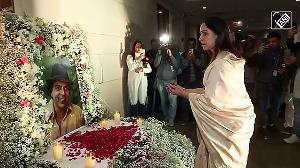Cometh the hour, cometh the man. It was the word-class economist Manmohan Singh who hogged the limelight at the Asia-Europe Summit in Beijing on Friday.
Such was the effect of the speech -- the prime minister spoke last at the 45-country session-- that a normally reticent Chinese premier Wen Jiabao complimented Dr Singh in his concluding remarks.
The prime minister essentially listed out three failures behind the economic turbulence:
1. Regulatory and supervisory failure in developed countries
2. Failure in risk management in private financial institutions
3. Failure in market discipline mechanism.
Dr Singh then went on to say, 'These are not my views, but those of the distinguished managing director of IMF (Dominique Strauss-Kahn) with which I agree. We must analyse objectively how and why these failures have occurred with such ferocity."
He said, "The sad truth is that in this age of globalisation we have a global economy of sorts, but it is not supported by a global polity to provide effective governance."
The prime minister then elaborated that the global financial structure needs a supervisor and regulator. While top leaders listened, he said, "The resulting crisis of liquidity, accumulation of bad assets, shortage of capital and collapse of confidence threaten to spill over into the real economy by way of reduced demand for exports, reduced access to trade and suppliers' credits superimposed on other crises.
"The crisis of food shortages and fuel price hike have strained budgets and balance of payment leading to rising inflation and living costs in many developing countries."
In his speech, he said, 'The President of the World Bank has identified at least 30 countries whose balance of payments will experience a severe deterioration in the wake of financial crisis."
While speaking on a solution to the crisis, he said, "The immediate task is to de-clog the credit markets the world over. Coordinated global action is essential to restore a measure of confidence in the credit market."
He added, "From the stand point of developing countries, international financial institutions, particularly the International Monetary Fund and the International Bank for Reconstruction and Development need to put in place exogenous facilities to provide additional assistance more quickly and in large amounts, with less service conditionality and greater flexibility."
Dr Singh must have struck a chord with many Asian leaders when he said that globalisation without global financial governance structure can lead to severe problems as has been seen in the recent turmoil.
While advising solid steps for stability of the global economy, the prime minister told the august gathering that as a counter cyclical device, increased infrastructure investments in developing countries, if backed by increased resource flows from multinational financial institutions such as the IBRD and the Regional Development Banks, can act as a powerful stabilizer.
The IMF should revisit the potentially powerful instrument of creating liquidity through fresh allocation of Special Drawing Rights in favour of multilateral development financial institutions.
While giving a clear direction for the action, Singh said the reform of reconstruction of financial system has to be a collective international effort since borders no longer confine financial institutions or can keep out financial turmoil.
Given the growth in cross-border investment, trade and banking in the last three decades, the world must ponder over the need for a global monitoring authority to promote global supervision and cooperation in the increasingly integrated world we live in.
While putting his fingers on the problem that created this economic mess, he said, "Massive failure of regulatory and supervisory mechanism has really been the reason for the present turmoil and if there had been a good regulatory mechanism, this would not have happened."
Dr Singh said the IMF should revisit the potentially powerful instrument of creating liquidity through fresh allocation of Special Drawing Rights in favour of multilateral development finance institutions.
When Singh speaks on the global economy's most crucial hour, how can he not remember Keynes?
He said, "In devising a reform agenda, one must bear in mind the wise saying of John Maynard Keynes regarding the economically damaging role of excessive speculative or innovative activity. To quote Keynes: "Speculators may do no harm as bubbles on a steady stream of enterprise. But the position is serious when enterprise becomes the bubble on a whirlpool of speculation. When the capital development of a country becomes a byproduct of the activities of a casino, the job is likely to be ill-done."
Importantly, while sending signals to world leaders and perhaps even to pessimists and critics at home, Singh asserted, "India's economy is sound and is likely to grow at 7 to 7.5 per cent."
He said, "India's banking system is sound and well capitalised. It is not exposed to type of assets which have given rise to this crisis."
While adding a note of caution, he said, "We realise that we cannot remain totally unaffected when the global economy is in deep trouble. Our stock markets and the exchange rate of the rupee are under pressure due to capital outflow of foreign institutional investors. Sooner or later, the real economy is bound to experience the pain."
Dr Singh assured that India is ready to cooperate its actions with the world community to find pragmatic solutions to the formidable challenges the world economy is now faced with.
The prime minister's stock has certainly gone up on the day when the Sensex in Mumbai went down by 13-5 per cent. However, in a world where only money matters, Singh was heard in Beijing with rapt attention.





